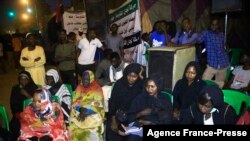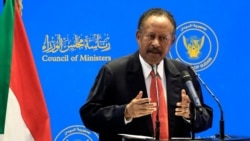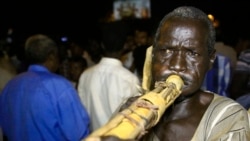On Monday, as thousands of demonstrators aligned with the Sudan military remain outside the presidential palace for a third day, analysts warn that the civilian-led interim government is facing a growing crisis that could topple its rule.
With upheaval escalating nationwide, government leaders must find a way to "defuse the polarization" and "reach a compromise," said political analyst Hassan Haj Ali.
Prime Minister Abdalla Hamdok should "make a partial reshuffle of his Cabinet and appoint new ministers" or expand the number of ministers in the transitional government, Ali said.
Sudan is facing its most trying political challenges since it formed an interim government among rival factions after the fall of ex-president Omar al-Bashir in 2019.
After a political coup attempt was thwarted in September, al-Bashir loyalists have upped their dissent and are demanding changes to the civilian Cabinet and the shaky coalition co-running the government.
"The essence of this crisis … is the inability to reach a consensus on a national project among the revolutionary and change forces," Hamdok said in a televised address last week.
People participating in the massive sit-in outside the presidential palace in Khartoum are demanding the government be dissolved and replaced with technocrats.
Sudan will never have a stable government if only a small group of people continue to make the decisions, said protester Ibrahim Ishaaq Yousif.
"The situation is deteriorating every day, people are unable to find bread, and life has become hard for everyone in this country," he told South Sudan in Focus. "The government has been dominated by only four political parties, and they are unable to do something to change the situation."
Interim government supporters say members of the military and security forces are driving the latest protests, which involve counterrevolutionary sympathizers of al-Bashir.
Some protesters accuse political parties within the Forces of Freedom and Change (FFC) alliance of excluding them from the country's political processes and say the government is not doing enough to achieve the objectives of Sudanese revolutionaries who sacrificed their lives for the cause.
Hamdok should consider dissolving the Cabinet and expanding the political participation in the FFC coalition, said protester Omer Yousif.
Hamdok should "change this Cabinet not from the parties but from the professionals among the common people," he told South Sudan in Focus. "All the infrastructures will be damaged soon. That is why we focus on changing this regime for the better."
Khartoum-based analyst Ali said the government must quickly institute changes.
"Now the trend or the compromise probably is that the prime minister would perform a partial change in his government in order to please those who are demanding change and at the same time keep his own coalition intact by letting members stay in the council of ministers," Ali told South Sudan in Focus.
Ali also recommends setting a timetable for the composition of the legislative assembly and taking steps toward organizing a general election, which is tentatively slated for late 2023.
The protesters began the sit-in on Saturday by chanting "one people, one army" and setting up tents in front of the presidential palace. They say they will not leave until their demands are met.
"The country is striving, and the people are tired," said protester Muhiddeen Adam Juma, a member of the Sudan Liberation Movement faction. "People need to move to real democracy and prosperity.
"But few political forces want to drive the policy of this county by the same policies of the previous administration," Juma told South Sudan in Focus. "And these policies will never take us anywhere."
Hamdok, in his televised address, reiterated the government's commitment to dialogue and to seeking a solution to any political disputes. He also guaranteed the safety and security of people who take part in peaceful protests.
"We respect the right of our people for a peaceful democratic expression," he said. "They got this right through their continuous struggle, and we shall work to safeguard this right."
VOA's Nabeel Biajo contributed to this report from Washington.


